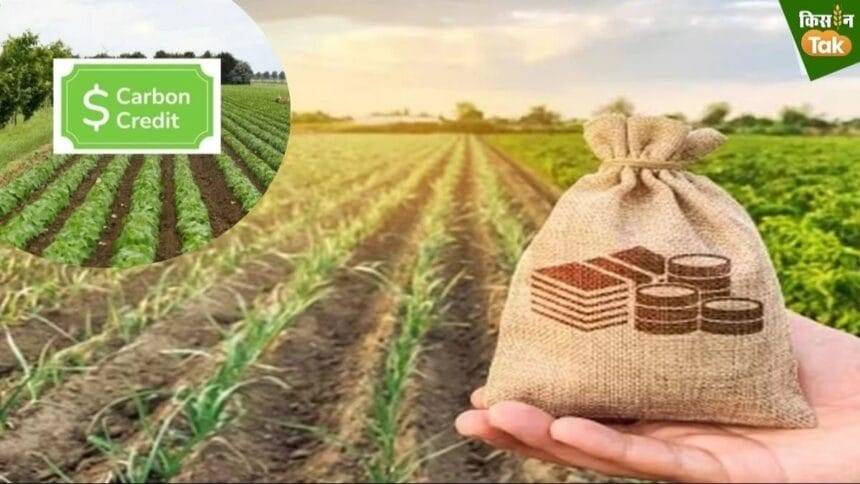Main Points In Hindi (मुख्य बातें – हिंदी में)
-
सतत कृषि विधियों को अपनाने के लिए प्रोत्साहन: किसानों को पर्यावरण की रक्षा के उद्देश्य से सतत कृषि विधियों को अपनाने के लिए प्रोत्साहित किया जा रहा है, जिसमें 8 राज्यों के छोटे किसानों को कार्बन क्रेडिट के माध्यम से वित्तीय सहायता दी जाएगी।
-
कार्बन क्रेडिट के लिए ऑडिट प्रक्रिया: ग्रो इंडिगो के कार्बन प्रमुख उमंग अग्रवाल के अनुसार, वैश्विक स्वैच्छिक कार्यक्रम के तहत पहले पुनर्स्थापना कृषि कार्बन प्रोग्राम का ऑडिट पूरा हो चुका है, और किसानों को अगले कुछ महीनों में कार्बन क्रेडिट दिए जाएंगे।
-
80,000 किसानों की भागीदारी: कार्बन प्रोजेक्ट में 80,000 किसानों को शामिल किया गया है, जो चावल, गेहूं, कपास, मक्का, और अन्य फसलों की खेती कर रहे हैं। ये किसान विभिन्न राज्यों में 40,000 हेक्टेयर भूमि पर कृषि कर रहे हैं।
-
किसानों को राजस्व का 75% लाभ: डीएसआर विधि को अपनाने वाले किसान कार्बन क्रेडिट के लिए पंजीकरण करते हैं। इस परियोजना में, किसानों को अर्जित राजस्व का 75% लौटाया जाएगा।
- चार कंपनियों का सहयोग: बायर, शेल, मित्सुबिशी, और जेनज़ीरो जैसी कंपनियाँ नौ राज्यों में अपने कार्बन क्रेडिट प्रोजेक्ट का विस्तार कर रही हैं, जिसका उद्देश्य किसानों को स्मार्ट कृषि विधियों को अपनाने में मदद करना है।
Main Points In English(मुख्य बातें – अंग्रेज़ी में)
Here are the main points from the provided text:
-
Encouragement of Sustainable Farming: Small farmers in 8 Indian states are being motivated to adopt sustainable farming practices to mitigate environmental impacts, with financial assistance through carbon credits.
-
Carbon Credit Audit and Certification: The first Regenerative Agriculture Carbon Program under the Veera protocol has completed its audit, and carbon credits will soon be awarded to farmers based on certification.
-
Engagement of Farmers: Approximately 80,000 farmers across multiple states are participating in the Carbon Project, which focuses on sustainable practices like direct-seeded rice (DSR), nitrogen management, and crop residue management across over 40,000 hectares.
-
Revenue Sharing Model: Farmers who register for carbon credits through the DSR method will receive 75% of the revenue generated by the sale of these credits, which are purchased by businesses unable to reduce their own emissions.
- Expansion by Agricultural Companies: Major companies like Bayer, Shell, Mitsubishi, and GenZero are expanding their carbon credit projects across 9 states, with a plan to add 8,500 hectares, already resulting in a reduction of 100,000 tons of carbon dioxide and methane emissions over the past year.


Complete News In Hindi(पूरी खबर – हिंदी में)
किसानों को पर्यावरण की रक्षा के लिए स्थायी खेती के तरीकों को अपनाने के लिए प्रोत्साहित किया जा रहा है। इस पहल में उत्तर प्रदेश, मध्य प्रदेश, हरियाणा, पंजाब और महाराष्ट्र सहित 8 राज्यों के छोटे किसानों को जल्दी ही कार्बन क्रेडिट के जरिए वित्तीय सहायता दी जाएगी। ये किसान कम कार्बन उत्सर्जन के लिए सुझाए गए खेती के तरीकों को अपनाते हैं और कार्बन प्रोजेक्ट से जुड़े हुए हैं। साथ ही, कृषि क्षेत्र से जुड़ी 4 कंपनियाँ 9 राज्यों में 10,000 से ज्यादा किसानों के साथ मिलकर कार्बन क्रेडिट दे रही हैं।
कार्बन क्रेडिट देने के लिए ऑडिट
ग्रो इंडिगो के कार्बन प्रमुख उमंग अग्रवाल के अनुसार, कार्बन स्टैंडर्ड वेरा प्रोटोकॉल के तहत पहले पुनर्जनन कृषि कार्बन कार्यक्रम का ऑडिट पूरा हो चुका है। यह ग्रीनहाउस गैसों को कम करने के लिए एक वैश्विक स्वैच्छिक कार्यक्रम है। उमंग अग्रवाल ने फाइनेंशियल एक्सप्रेस को बताया कि वेरा स्टैंडर्ड के अनुसार प्रमाणन के आधार पर किसानों को आने वाले कुछ महीनों में कार्बन क्रेडिट दिया जाएगा। उन्होंने बताया कि कंपनी के पहले प्रोजेक्ट का थर्ड पार्टी ऑडिट पूरा हो चुका है और अब यह वेरा के पास क्रेडिट जारी करने के लिए है।
80,000 किसान कार्बन प्रोजेक्ट में शामिल
उन्होंने कहा कि कार्बन प्रोजेक्ट छोटे किसानों की मदद करता है, जो चावल, गेहूं, कपास, मक्का, गन्ना और बागवानी की फसलों की खेती कर रहे हैं, जैसे कि डीएसआर विधि, नाइट्रोजन प्रबंधन, फसल अवशेष प्रबंधन में। कंपनी ने हरियाणा, पंजाब, महाराष्ट्र, गुजरात, मध्य प्रदेश, उत्तर प्रदेश, आंध्र प्रदेश और तेलंगाना के 80,000 किसानों को जोड़ा है, जो विभिन्न कार्बन प्रोजेक्ट्स का हिस्सा हैं और 40,000 हेक्टेयर से अधिक भूमि पर फसलें उगाते हैं।
किसानों को 75 प्रतिशत राजस्व मिलेगा
डीएसआर विधि से चावल और गेहूं की खेती करने वाले किसान कार्बन क्रेडिट पाने के लिए इस प्रोजेक्ट में पंजीकरण करते हैं। डीएसआर विधि में, बीजों को सीधे खेत में बोया जाता है, जिससे पानी की लागत में कमी आती है और मिट्टी की जैविक सामग्री बचती है। उमंग अग्रवाल ने कहा कि विमानन, खनन या उर्वरक निर्माता किसानों से कार्बन क्रेडिट खरीदते हैं, क्योंकि वे अपने व्यवसाय के कारण कार्बन उत्सर्जन को कम नहीं कर सकते। उन्होंने बताया कि हमारी कंपनी किसानों से कार्बन क्रेडिट इकट्ठा करती है और इसे खरीदारों को बेची जाती है। जबकि, क्रेडिट से कमाए गए राजस्व का 75 प्रतिशत हिस्सा किसानों को वापस किया जाएगा।
9 राज्यों में 4 कंपनियों का प्रोजेक्ट
कृषि क्षेत्र में काम कर रही कंपनियाँ, जैसे बायर, शेल, मिट्सुबिशी और जेनज़ीरो, 9 राज्यों में अपने कार्बन क्रेडिट प्रोजेक्ट का विस्तार करने का निर्णय लिया है ताकि चावल किसानों को स्मार्ट खेती और डीएसआर विधि अपनाने में मदद मिल सके। इस प्रोजेक्ट में लगभग 8,500 हेक्टेयर खेती जोड़ने की योजना है। पिछले एक साल में, इस प्रोजेक्ट ने कृषि से कार्बन डाइऑक्साइड और मीथेन के उत्सर्जन को लगभग 100,000 टन कम किया है। 10,000 किसानों को इस प्रोजेक्ट से लाभ मिला है, जो आंध्र प्रदेश, बिहार, हरियाणा, कर्नाटक, ओडिशा, तमिलनाडु, तेलंगाना, उत्तर प्रदेश और पश्चिम बंगाल में 25,000 हेक्टेयर भूमि पर खेती कर रहे हैं।
इसे भी पढ़ें –
Complete News In English(पूरी खबर – अंग्रेज़ी में)
Farmers are being encouraged to adopt sustainable farming methods with the intention of protecting the environment. In this initiative, small farmers of 8 states including Uttar Pradesh, Madhya Pradesh, Haryana, Punjab and Maharashtra will soon be given financial help in the form of carbon credit. These farmers are adopting suggested farming methods to reduce carbon emissions and are associated with the Carbon Project. At the same time, 4 companies related to agriculture sector are working with more than 10 thousand farmers to give carbon credits in 9 states.
Audit for giving carbon credits
According to Umang Agarwal, carbon head of Grow Indigo, a joint venture between Indian seed firm Mahico and American firm Indigo, the audit of the first Regenerative Agriculture Carbon Program under the Carbon Standard Veera protocol has been completed. This is a global voluntary program to reduce greenhouse gases. Umang Aggarwal told Financial Express that carbon credits will be given to farmers in the next few months on the basis of certification as per Veera Standard. He said that the company’s first project has completed the third party audit and now the audit is with Veera for releasing the credit.
80 thousand farmers joined carbon project
He said that the Carbon Project helps small farmers cultivating rice, wheat, cotton, maize, sugarcane and horticulture in many works including paddy cultivation through DSR method, nitrogen management, crop residue management. The company has engaged 80,000 farmers in Haryana, Punjab, Maharashtra, Gujarat, Madhya Pradesh, Uttar Pradesh, Andhra Pradesh and Telangana who are part of multiple carbon projects and cultivate crops in more than 40,000 hectares.
Farmers will get 75 percent of the revenue
Farmers adopting DSR method for paddy and wheat cultivation register for the project to get carbon credit. In DSR method, seeds are sown directly in the field instead of nursery, which reduces the cost of water and saves the organic biomass of the soil. Umang Aggarwal said that aviation, mining or fertilizer manufacturers buy carbon credits from farmers. Because, they cannot reduce carbon emissions due to their business. He said that our company collects carbon credits from farmers and will sell it to buyers. Whereas, 75 percent of the revenue earned from credit is returned to the farmers.
Project of 4 companies in 9 states
Companies working in the agriculture sector, Bayer, Shell, Mitsubishi and GenZero have decided to expand their carbon credit project in 9 states to help paddy farmers adopt smart farming methods and DSR method. There is a plan to add about 8,500 hectares of farming in the project. In the last one year, this project has reduced annual carbon dioxide and methane emissions from agriculture by about 100,000 tons. 10,000 farmers have benefited from the project. These farmers cultivate more than 25,000 hectares of land in Andhra Pradesh, Bihar, Haryana, Karnataka, Odisha, Tamil Nadu, Telangana, Uttar Pradesh and West Bengal.








